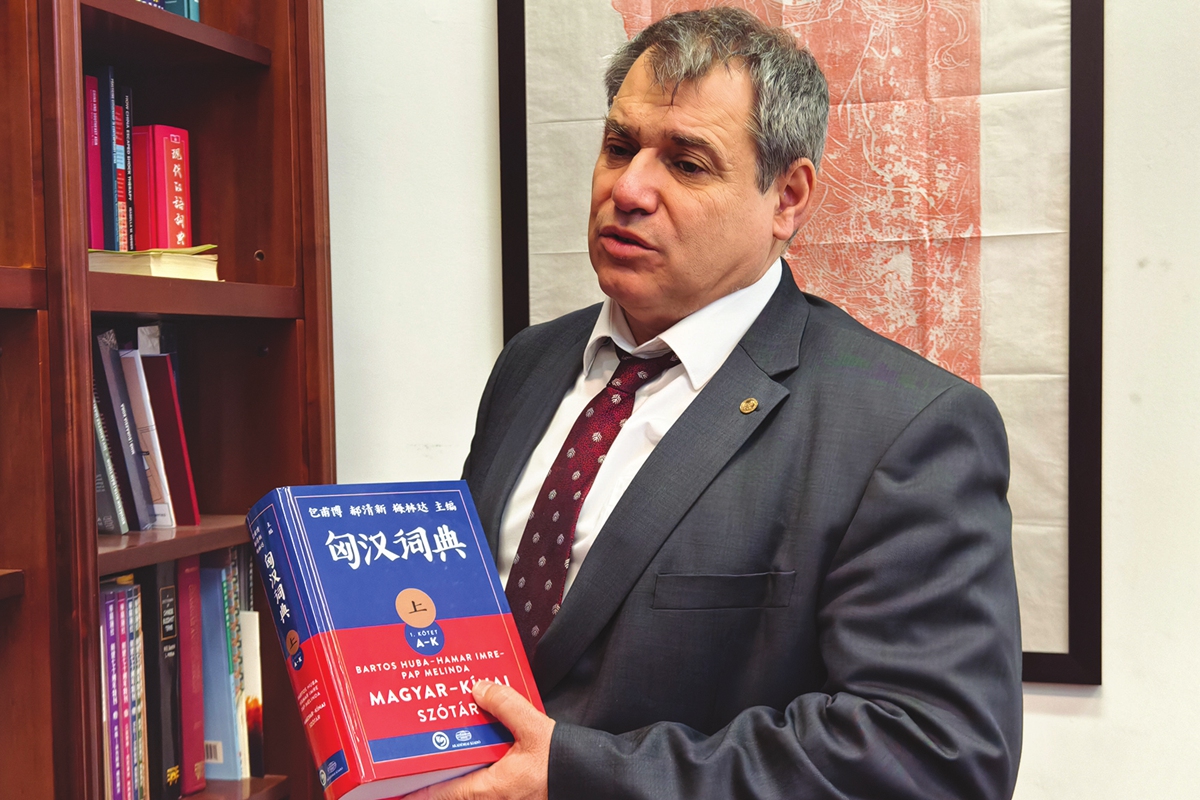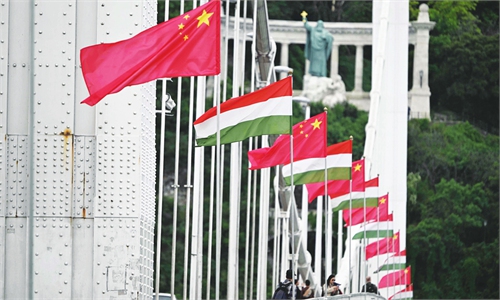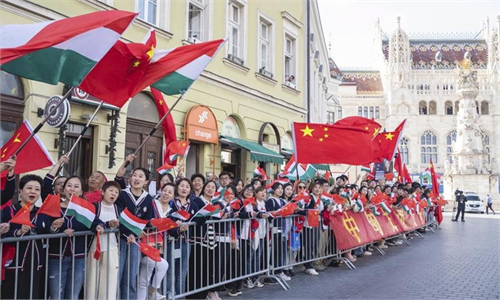ARTS / CULTURE & LEISURE
Hungarian sinologist sees language as bedrock of exchanges

Hungarian sinologist Imre Hamar holds a Hungarian-Chinese dictionary. Photo: Zhao Juecheng/GT
Hungarian sinologist Imre Hamar speaks fluent Putonghua that one can hardly distinguish him as a non-native speaker from his accent. Hamar, also known by his Chinese name Hao Qingxin, fell in love with Chinese culture, particularly ancient Chinese literature and Buddhist philosophy when he had an opportunity to study in Beijing more than 30 years ago.Over years of learning about the country, Hamar is now no longer just well informed about Chinese culture, but is also an educator who promotes Hungary-China exchanges between the younger generations. He told the Global Times that the Chinese language is a tool that smooths the cooperation between Hungary and China not only culturally, but also economically and politically.
'More than a think tank'
Among Hamar's many titles, he has been the head of the Department of Chinese Studies at the Eötvös Loránd University (ELTE) in Budapest since 2002. In 2006, he also became the Foreign Dean of the Confucius Institute at the university.
He told the Global Times that the institution was the first Confucius Institute that was established in Hungary. It embraces around 2,000 students across the country. Aside from teaching the Chinese language, the institute also offers the public more than 50 cultural events every year to connect locals with Chinese cultural traditions like the classic ink and wash painting.
"A country's language closely links to its culture, so teaching Chinese language here is a major way for people in Hungary to see and understand China," Hamar told the Global Times.
So far, a total of five Confucius Institutes have been opened in Hungary.
Before the Confucius Institute was established, Hamar was already an insider at the ELTE's Department of Chinese Studies. He told the Global Times that the department was like the cradle of the first batch of sinologists in Hungary.

A view of Budapest, capital of Hungary Photo: VCG
Established in 1923, the department was mainly aimed to study ancient Chinese texts and literature. In the 1950s, along with the growing consensus on educational exchanges between China and Hungary, a group of local professors was sent abroad by the Hungarian government to Chinese institutions of higher learning such as Peking and Tsinghua universities.Their Chinese experiences, including two professors who later served in the department, have significantly broadened the Hungarian intellectual community's understanding of China, and also encouraged young scholars like Hamar to always seek for collaborations with China.
Over the last 22 years, the department has not only maintained its research tradition, but is more interested in designing curriculums that cater to today's connection between China and Hungary, Hamar told the Global Times.
Capitalizing on the two countries' vibrant economic exchanges in recent years, Hamar revealed that a new course was offered to cultivate a new crop of translators who not only understand the Chinese language, but also know about the country's laws, economy, and politics.
"China is a big investor in Hungary, so we need young talents to work as mediators in corporations and businesses," Hamar emphasized.
The new agenda embodies the department's elaborated role of not only research, but also "serving for social change," Hamar told the Global Times. It is walking proof that the relationship between China and Hungary is becoming closer and closer.
"A university aims to cultivate talents contributing to social growth. A university is not just a think tank, but also an organ that provides social services," Hamar emphasized.
Collaborative spirit
To better engage students who love Chinese culture, Hamar has developed a teaching philosophy of localizing Chinese language education in Hungary. He has not only compiled the first set of Chinese textbooks in Hungarian, but also launched a mutually translated dictionary project that incorporates both Chinese and Hungarian.
"It was a project that lasted for a decade. There are a total of four dictionaries launched and each of them consists of around 80,000 entries," said Hamar.
With his rich experience of learning about China, Hamar has deeply realized that the China-proposed Belt and Road Initiative (BRI) will continue to shed light on the two countries' cultural and economic exchanges.
He told the Global Times that the BRI has enhanced Hungary's infrastructural growth such as increasing the number of railways. China has also shared with the country new and advanced technologies.
"What we respect most about China is that the country's proposed cooperation with us is always facilitated on the basis of promoting the two countries' mutual benefits and peace," Hamar emphasized.
He also noted that China's power and collaborative spirit with the world should be valued by the international community.
As a European scholar who truly appreciates China, Hamar has been tirelessly bridging the country's strengths with European scholarly communities, especially when misunderstandings occur.
"I attended a conference in Germany three months ago, and it was about assessing the risk for Europe in cooperating with China. I happen to hear some false criticisms about China at the meeting, but my rejection of such statements was firm," he told the Global Times.
"Europe cannot avoid collaborating with China, I believe; and I think if we really achieved a consensus, then Europe would have regret but not China," Hamar emphasized.



